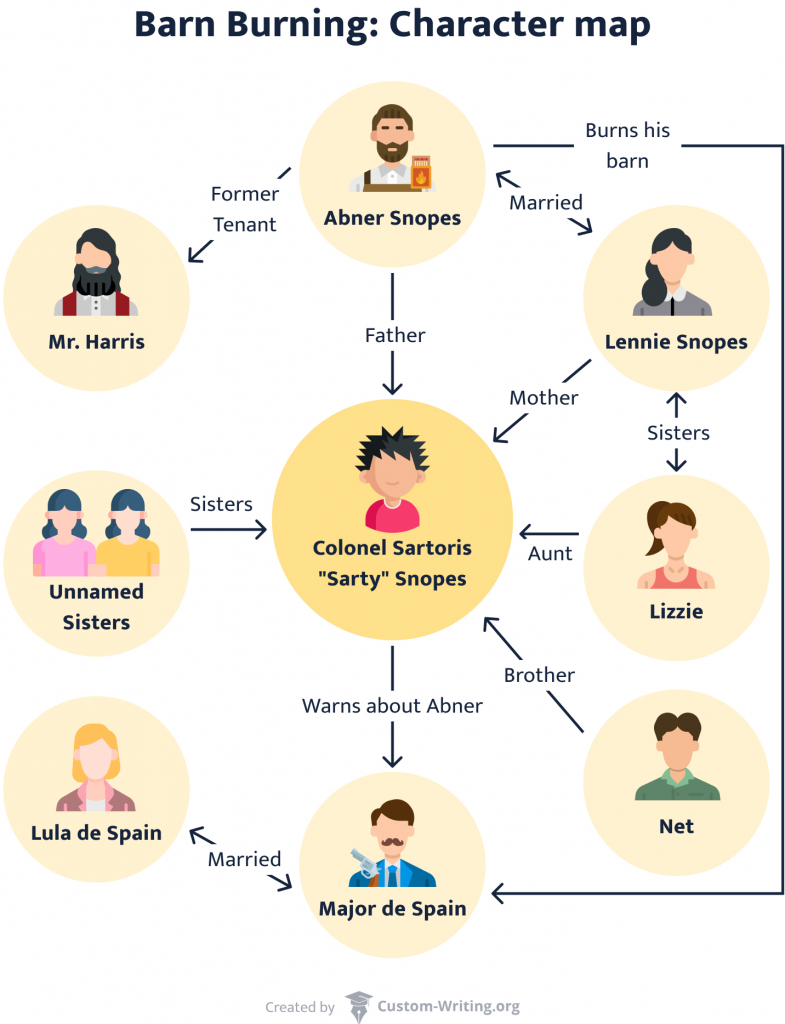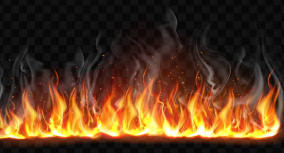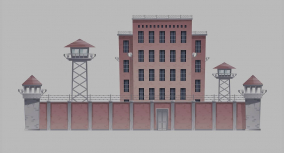William Faulkner’s “Barn Burning” features Abner Snopes and Sartoris Snopes as central figures in a story of moral conflict and familial loyalty. In this “Barn Burning” character analysis, you will explore how the tensions between Abner and Sartoris shape the narrative and how they represent the clash of authority and morality. Alongside a “Barn Burning” summary, you’ll find insights into the story’s themes, symbols, and other aspects. Keep reading to learn all about the “Barn Burning” characters and the timeless questions they deal with.
Barn Burning Character Map
Want to know about the relationships between characters in “Barn Burning”? Check out this detailed character map!

Who Is Sarty in Barn Burning?
Sarty is a ten-year-old boy, the youngest son of Abner Snopes. He is the main character in “Barn Burning,” often referred to as “the boy” by William Faulkner.
He is quite different from the rest of the Snopes family members. He has hopes for the future and the courage to resist his father. He ends up metaphorically escaping the reality in which he lives by running into the forest.
Sarty stands out among other characters in Faulkner’s short story. Despite his father being consumed by anger that results in destructive actions, the boy has the courage to resist Abner’s convictions.
Sarty’s internal conflict represents the clash between familial loyalty and a growing sense of justice, which embodies the tension prevalent in the Southern society of that time. Through Sarty’s journey, the author explores themes of morality, justice, and the desire for a more honorable life in spite of challenging circumstances.
Sarty’s escape into the forest at the end of the story is a metaphorical break from the oppressive reality that suggests there is a brighter future for him.
Barn Burning: Sarty Character Analysis
Even though Satoris is only ten years old, he is far more perceptive than the adult characters of the story. The boy knows what’s going on when his father tries to manipulate him using family loyalty. Unlike his older brother, John, Satoris doesn’t blindly follow his father’s ideas. Instead, the boy tries to prevent Abner’s destructive actions.
In the end, he chooses to follow his own path and goes against the family “honor.” This gives readers hope that maybe a circle of bitterness can be broken and there’s still hope for a better future.
Satoris’ rebellion against his father’s actions not only showcases his individuality but also his willingness to go against his family and their beliefs. The boy’s conscious choice to diverge from Abner’s beliefs hints at a broader theme of the story: the possibility of breaking free from a history of bitterness.
Colonel Sartoris Snopes Character Development
Sarty goes through an enormous transformation throughout the story. Abner forces his son to burn barns and to lie on the stand for him. At first, the boy goes along with his father’s instructions, as he looks up to him and feels loyal. However, as the story progresses, the readers see how Abner’s destructive actions come into conflict with Sarty’s internal desire for justice and honesty.
The story covers the events of six days, and within this period, the boy undergoes an enormous change and turns from a child into an adult.
- When the readers are first introduced to Sarty, he’s scared and hungry. Although the boy doesn’t want to lie to protect his father, he feels compelled to do so because he feels loyal to his family and believes his father’s enemies are his own.
- The first time the readers can see the boy’s demeanor toward his father change is when Abner accuses him of planning not to lie and hits him. After the incident, Sarty realizes that his father is also not always fair. However, despite his desire to run away, the boy feels that something holds him back from abandoning the family.
- The moment when Abner asks his son to get oil to burn down the de Spain barn becomes crucial in Sarty’s character development. The fact that both his brother and father know he disagrees with what they do and still proceed with the plan only contributes to the boy’s dismay. This situation is the moment Sarty chooses to make his own decisions and follow his sense of justice.
Sarty Snopes’ Quotes
He could not see the table where the Justice sat and before which his father and his father’s enemy (our enemy he thought in that despair; ourn! mine and hisn both! He’s my father!) stood, but he could hear them, the two of them that is, because his father had said no word yet.
Barn Burning, Sarty Snopes
Later, twenty years later, he was to tell himself, “If I had said they wanted only truth, justice, he would have hit me again.” But now he said nothing.
Barn Burning, Sarty Snopes
They are safe from him. People whose lives are a part of this peace and dignity are beyond his touch, he no more to them than a buzzing wasp: capable of stinging for a little moment but that’s all; the spell of this peace and dignity rendering even the barns and stable and cribs which belong to it impervious to the puny flames he might contrive . . .
Barn Burning, Narrator
Abner Snopes in Barn Burning
Abner Snopes is another central character in the “Barn Burning.” He is a poor man trying to make a living for his family by harvesting crops. He despises rich people and influential society. He tries to instill the same type of hatred into his kids as well. Out of his resentment, he burns barns of wealthy people he works for. That’s why he has to move from place to place with his family continually.
There is no character development in Abner. He is a cold and abusive man throughout the story. He does not respect, nor is he afraid of the law. He takes justice into his hands. Abner’s inability to express his feelings and thoughts openly manifests in violent actions towards his family, wealthy members of society, and their property. Some critics believe that Abner is the product of the time he lived, and they even justify his actions.
Why Does Abner Snopes Burn Barns?
Fire in “Barn Burning” symbolizes Abner Snopes’s powerlessness and desperate desire for control. Abner’s motivations for burn-burning are complex. They are rooted in personal frustration, class conflict, and a desire for retribution. Coming from a poor background, the father of the Snopes family sees himself as a victim of an unjust society. He denies his criminal past and refuses to change his way of life by directing his anger at those more well-off than him.
Abner Snopes has no power and can’t even provide for his family. However, he feels in control when he sets fire to others’ property. The act turns into a form of retribution. Abner believes that he reclaims a semblance of power in a world that is determined to keep him down.
Tall, stiff, and bitter, the man’s physical appearance mirrors his psychological resentment and bitterness against his social status. His rage drives him to self-defeating acts like barn burning and ruining Major de Spain’s rug. These actions reflect Abner’s belief that challenging the status quo is the only way out of his predicament, even if the man knows it won’t bring about any real change.
Abner Snopes’ Quotes
His father spoke for the first time, his voice cold and harsh, level, without emphasis: “I aim to. I don’t figure to stay in a country among people who . . .” he said something unprintable and vile, addressed to no one.
Barn Burning, Abner Snopes
You’re getting to be a man. You got to learn. You got to learn to stick to your own blood or you ain’t going to have any blood to stick to you. Do you think either of them, any man there this morning, would? Don’t you know all they wanted was a chance to get at me because they knew I had them beat? Eh?
Barn Burning, Abner Snopes
His father had not spoken again. He did not speak again. He did not even look at her. He just stood stiff in the center of the rug, in his hat, the shaggy iron-gray brows twitching slightly above the pebble colored eyes as he appeared to examine the house with brief deliberation. Then with the same deliberation he turned; the boy watched him pivot on the good leg and saw the stiff foot drag round the arc of the turning, leaving a final long and fading smear. His father never looked at it, he never once looked down at the rug.
Barn Burning, Narrator
Major de Spain in Barn Burning
Major de Spain is Abner’s new employer. He is a wealthy and influential landowner that presents himself as a just and law-abiding citizen. However, he doesn’t respect the law and thinks he can challenge the authority, just like Abner.
De Spain owns one of the most extensive plantations in the entire county of Yoknapatawpha. His social status immediately turns him into Abner’s enemy.
Major de Spain’s Quotes
“Pretty and white, ain’t it?” he said. “That’s sweat. Nigger sweat. Maybe it ain’t white enough yet to suit him. Maybe he wants to mix some white sweat with it.”
Barn Burning, Major de Spain
Major de Spain claims it cost a hundred dollars. October corn will be worth about fifty cents. I figure that if Major de Spain can stand a ninety-five-dollar loss on something he paid cash for, you can stand a five-dollar loss you haven’t earned yet. I hold you in damages to Major de Spain to the amount of ten bushels of corn over and above your contract with him, to be paid to him out of your crop at gathering time. Court adjourned.
Barn Burning, The Justice
Behind him the white man was shouting, “My horse! Fetch my horse!” and he thought for an instant of cutting across the park and climbing the fence into the road, but he did not know the park nor how high the vine-massed fence might be and he dared not risk it.
Barn Burning, Narrator
Secondary Characters in Barn Burning
- Lennie Snopes
Lennie is the mother of Sarty and Abner’s wife. She serves as a voice of reason in the story. Lennie suffers violence throughout her marriage, yet she doesn’t turn into a bitter person. Even though her husband silences her, she can instill moral values into Sarty. - Sarty’s twin sisters
The daughters of Abner and Lennie are different from Sarty. They don’t share the same moral struggles, and they are very passive throughout the story. - Sarty’s brother
The brother’s name is not mentioned in the story. However, the reader learns that he is older than Sarty. He stays quiet about his personal feelings and struggles, but it seems that he supports Abner’s actions and is very loyal to him. - Lizzie
Lizzie is Lennie’s sister who lives with the family and stays silent throughout the story. Only by the end, she tells Abner that she will inform Major de Spain about the barn’s burning. - Mr. Harris
Mr. Harris is a farmer and an ex-neighbor of the Snopes. He takes Abner to court for the barn burning at the beginning of the story. He wants Sarty to testify against his father but refuses to pursue it after some consideration. - The Justices (I & II)
Both judges preside over the case and rule against Abner. However, they still show mercy to him: the first judge tells Abner to leave the county, and the second one lessens the punishment because of Abner’s financial situation.
Now, you know all about the characters of “Barn Burning.” If you want to explore the story even further, check out our list of essay topics.











